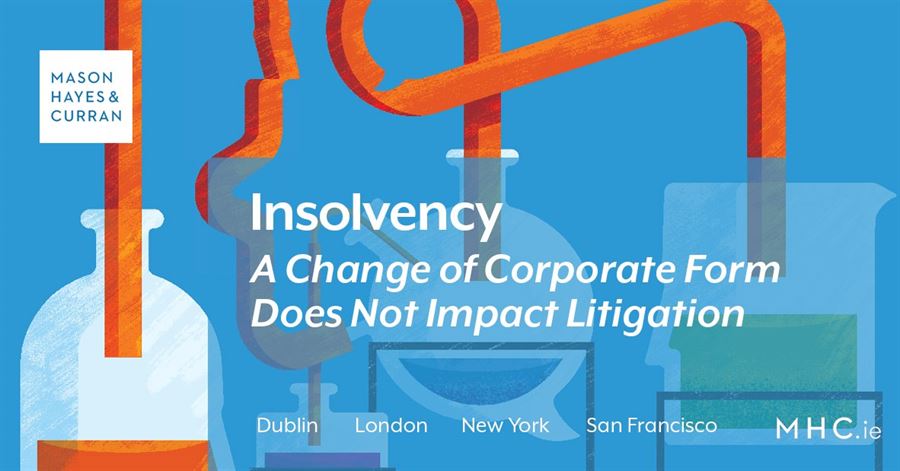Insolvency Update: A Change of Corporate Form Does Not Impact Litigation

In Start Mortgages Designated Activity Company v Simon Kavanagh and Anor,[1] a net point of practice and procedure has helpfully clarified that there is no need for a company to make a formal application to amend the title of legal proceedings when it changes its corporate form from a limited company to a designated activity company (DAC).
Background
Start Mortgages Limited (Start) issued the proceedings in 2013 and in July 2016, it obtained an order for possession against Mr and Mrs Kavanagh.
In October 2016, Start converted from a limited company to a DAC. It then made an application to change the title of the proceedings to reflect this change in status. The Court granted the order sought.[2] This judgment concerns a subsequent application by the first defendant, Mr Kavanagh, seeking to have the order discharged.
 Issue
Issue
Mr Kavanagh’s main arguments were that:
- Start Mortgages Limited ceased to exist and that Start Mortgages DAC is a new company
- The order should not have been made in circumstances where a final order had already been granted in the proceedings
The court considered:
- What procedural steps, if any, should be taken by a company that has changed its status from a limited liability company to a DAC, to reflect this change in status in legal proceedings, and
- More specifically, if it is necessary for the company to make a formal application to court to amend the title of the proceedings
Findings
The Court rejected all of Mr Kavanagh’s arguments, finding:
- Start Mortgages DAC was not a new company. When a company re-registers as a DAC, its rights and obligations are not affected. It continues in being, albeit with a different status. The legal entitlement to continue proceedings following the change in status of a company is expressly provided for under Section 63(12) of the Companies Act 2014, which the Court viewed as self-executing.
- The amendment is a technical amendment only and does not affect the substance of the order for possession.
- Usefully, it is not necessary to make a formal application to court to reflect its change of status from a limited liability company to a DAC. However, if a company makes such an application, the court has an inherent jurisdiction to amend the title of proceedings.[3]
Conclusion
Orders amending the title of proceedings have been sought, from an abundance of caution, by most companies converting from a limited company to a DAC. The removal of this procedural step means that companies can now avoid the cost and delay associated with bringing such applications.
While the judgment, by close analogy, deals with conversion between a number of forms of entity, it is probably not safe to rely on it in a conversion from a company with unlimited liability to one with limited liability.
[1] [2019] IEHC 216.
[2] Pursuant to Order 17, Rule 4 of the Rules of the Superior Courts.
[3] But this should be sought under section 63 of the Companies Act 2014, rather than pursuant to Order 17, Rule 4 of the Rules of the Superior Courts..
Share this:


